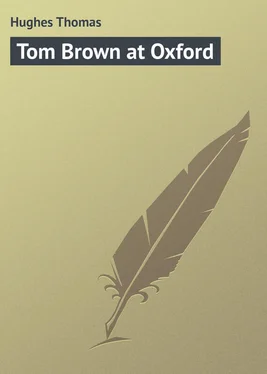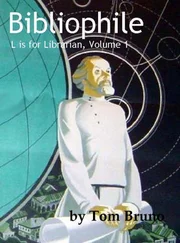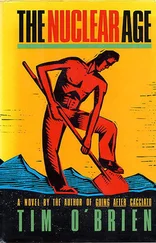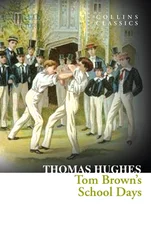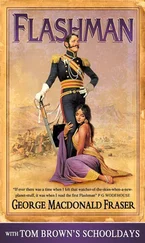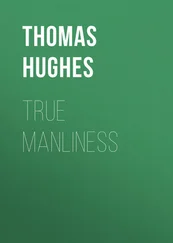Thomas Hughes - Tom Brown at Oxford
Здесь есть возможность читать онлайн «Thomas Hughes - Tom Brown at Oxford» — ознакомительный отрывок электронной книги совершенно бесплатно, а после прочтения отрывка купить полную версию. В некоторых случаях можно слушать аудио, скачать через торрент в формате fb2 и присутствует краткое содержание. Жанр: foreign_prose, foreign_language, на английском языке. Описание произведения, (предисловие) а так же отзывы посетителей доступны на портале библиотеки ЛибКат.
- Название:Tom Brown at Oxford
- Автор:
- Жанр:
- Год:неизвестен
- ISBN:нет данных
- Рейтинг книги:5 / 5. Голосов: 1
-
Избранное:Добавить в избранное
- Отзывы:
-
Ваша оценка:
- 100
- 1
- 2
- 3
- 4
- 5
Tom Brown at Oxford: краткое содержание, описание и аннотация
Предлагаем к чтению аннотацию, описание, краткое содержание или предисловие (зависит от того, что написал сам автор книги «Tom Brown at Oxford»). Если вы не нашли необходимую информацию о книге — напишите в комментариях, мы постараемся отыскать её.
Tom Brown at Oxford — читать онлайн ознакомительный отрывок
Ниже представлен текст книги, разбитый по страницам. Система сохранения места последней прочитанной страницы, позволяет с удобством читать онлайн бесплатно книгу «Tom Brown at Oxford», без необходимости каждый раз заново искать на чём Вы остановились. Поставьте закладку, и сможете в любой момент перейти на страницу, на которой закончили чтение.
Интервал:
Закладка:
Not so; in another minute a gentle knock came at the door. Jack pricked up his ears and wagged his tail; Drysdale recklessly shouted, "Come in!" the door slowly opened about eighteen inches, and a shock head of hair entered the room, from which one lively little gimlet eye went glancing about into every corner. The other eye was closed, but as a perpetual wink to indicate the unsleeping wariness of the owner, or because that hero had really lost the power of using it in some of his numerous encounters with men and beasts, no one, so far as I know, has ever ascertained.
"Ah! Mr. Drysdale, sir!" began the head; and then rapidly withdrew behind the door to avoid one of the spurs, which (being the missile nearest at hand) Drysdale instantly discharged at it. As the spur fell to the floor, the head reappeared in the room, and as quickly disappeared again, in deference to the other spur, the top boots, an ivory handled hair brush, and a translation of Euripides, which in turn saluted each successive appearance of said head; and the grin was broader on each reappearance.
Then Drysdale, having no other article within reach which he could throw, burst into a loud fit of laughter, in which Sanders and the head heartily joined, and shouted, "Come in, Joe, you old fool! and don't stand bobbing your ugly old mug in and out there, like a jack in the box."
So the head came in, and after it the body, and closed the door behind it; and a queer, cross-grained, tough-looking body it was, of about fifty years standing, or rather slouching, clothed in an old fustian coat, corduroy breeches and gaiters, and being the earthly tabernacle of Joe Muggles, the dog-fancier of St. Aldate's.
"How the deuce did you get by the lodge, Joe?" inquired Drysdale. Joe, be it known, had been forbidden the college for importing a sack of rats into the inner quadrangle, upon the turf of which a match at rat-killing had come off between the terriers of two gentlemen-commoners. This little event might have passed unnoticed, but that Drysdale had bought from Joe a dozen of the slaughtered rats, and nailed them on the doors of the four college tutors, three to a door; whereupon inquiry had been made, and Joe had been outlawed.
"Oh, please Mr. Drysdale, sir, I just watched the 'ed porter, sir, across to the buttery to get his mornin', and then I tips a wink to the under porter (pal o' mine, sir, the under porter), and makes a run of it right up."
"Well, you'll be quod'ed if you're caught! Now what do you want?"
"Why, you see, Mr. Drysdale, sir," said Joe, in his most insinuating tone, "my mate hev got an old dog brock, sir, from the Heythrop kennel, and Honble Wernham, sir of New Inn 'All, sir, he've jist been down our yard with a fighting chap from town, Mr. Drysdale – in the fancy, sir, he is, and hev got a matter of three dogs down a stoppin' at Milky Bill's. And he says, says he, Mr. Drysdale, as arra one of he's dogs'll draw the old un three times, while arra Oxford dog'll draw un twice, and Honble Wernham chaffs as how he'll back un for a fi' pun note;" – and Joe stopped to caress Jack, who was fawning on him as if he understood every word.
"Well, Joe, what then?" said Drysdale.
"So you see, Mr. Drysdale, sir," went on Joe, fondling Jack's muzzle, "my mate says, says he, 'Jack's the dog as can draw a brock,' says he, 'agin any Lonnun dog as ever was whelped; and Mr. Drysdale' says he, 'ain't the man as'd see two poor chaps bounced out of their honest name by arra town chap, and a fi' pun note's no more to he for the matter o' that, then to Honble Wernham his self,' says my mate."
"So I'm to lend you Jack for a match, and stand the stakes?"
"Well, Mr. Drysdale, sir, that was what my mate was a sayin'."
"You're cool heads, you and your mate," said Drysdale; "here, take a drink, and get out, and I'll think about it." Drysdale was now in a defiant humor, and resolved not to let Sanders think that his presence could keep him from any act of folly to which he was inclined.
Joe took his drink; and just then several men came in from lecture, and drew off Drysdale's attention from Jack, who quietly followed Joe out of the room, when that worthy disappeared. Drysdale only laughed when he found it out, and went down to the yard that afternoon to see the match between the London dog and his own pet.
"How in the world are youngsters with unlimited credit, plenty of ready money, and fast tastes, to be kept from making fools and blackguards of themselves up here," thought Sanders, as he strolled back to his college. And it is a question which has exercised other heads besides his, and probably is a long way yet from being well solved.
CHAPTER IV
THE ST. AMBROSE BOAT CLUB: ITS MINISTERY AND THEIR BUDGET
We left our hero, a short time back, busily engaged on his dinner commons, and resolved forthwith to make great friends with Hardy. It never occurred to him that there could be the slightest difficulty in carrying out this resolve. After such a passage as they two had had together that afternoon, he felt that the usual outworks of acquaintanceship had been cleared at a bound, and looked upon Hardy already as an old friend to whom he could talk out his mind as freely as he had been used to do to his old tutor at school, or to Arthur. Moreover, as there were already several things in his head which he was anxious to ventilate, he was all the more pleased that chance had thrown him across a man of so much older standing than himself, and one to whom he instinctively felt that he could look up.
Accordingly, after grace had been said, and he saw that Hardy had not finished his dinner, but sat down again when the fellows had left the hall, he strolled out, meaning to wait for his victim outside, and seize upon him then and there; so he stopped on the steps outside the hall-door, and to pass the time, joined himself to one or two other men with whom he had a speaking acquaintance, who were also hanging about. While they were talking, Hardy came out of the hall, and Tom turned and stepped forward, meaning to speak to him. To his utter discomfiture, Hardy walked quickly away, looking straight before him, and without showing, by look or gesture, that he was conscious of our hero's existence, or had ever seen him before in his life.
Tom was so taken aback that he made no effort to follow. He just glanced at his companions to see whether they had noticed the occurrence, and was glad to see that they had not (being deep in the discussion of the merits of a new hunter of Simmons's, which one of them had been riding); so he walked away by himself to consider what it could mean. But the more he puzzled about it, the less could he understand it. Surely, he thought, Hardy must have seen me; and yet, if he had, why did he not recognize me? My cap and gown can't be such a disguise as all that. And yet common decency must have led him to ask whether I was any the worse for my ducking, if he knew me.
He scouted the notion, which suggested itself once or twice, that Hardy meant to cut him; and so, not being able to come to any reasonable conclusion, suddenly bethought him that he was asked to a wine-party; and putting his speculations aside for a moment, with the full intention nevertheless of clearing up the mystery as soon as possible, he betook himself to the rooms of his entertainer.
They were fair-sized rooms in the second quadrangle, furnished plainly but well, so far as Tom could judge, but, as they were now laid out for the wine-party, they had lost all individual character for the time. Everyone of us, I suppose, is fond of studying the rooms, chambers, dens in short, of whatever sort they may be, of our friends and acquaintances – at least, I knew that I myself like to see what sort of a chair a man sits in, where he puts it, what books lie or stand on the shelves nearest his hand, what the objects are which he keeps most familiarly before him, in that particular nook of the earth's surface in which he is most at home, where he pulls off his coat, collar, and boots, and gets into an old easy shooting-jacket, and his broadest slippers. Fine houses and fine rooms have little attraction for most men, and those who have the finest drawing-rooms are probably the most bored by them; but the den of the man you like, or are disposed to like, has the strongest and strangest attraction for you. However, an Oxford undergraduate's room, set out for a wine-party, can tell you nothing. All the characteristics are shoved away into the background, and there is nothing to be seen but a long mahogany set out with bottles, glasses, and dessert. In the present instance the preparations for festivity were pretty much what they ought to be: good sound port and sherry, biscuits, and a plate or two of nuts and dried fruits. The host, who sat at the head of the board, was one of the main-stays of the College boat-club. He was treasurer of the club, and also a kind of a boating nurse, who looked-up and trained the young oars, and in this capacity had been in command of the freshmen's four-oar, in which Tom had been learning his rudiments. He was a heavy, burly man, naturally awkward in his movements, but gifted with a steady sort of dogged enthusiasm, and by dint of hard and constant training, had made himself into a most useful oar, fit for any place in the middle of the boat. In the two years of his residence, he had pulled down to Sandford every day except Sundays, and much farther whenever he could get anybody to accompany him. He was the most good natured man in the world, very badly dressed, very short sighted, and called everybody "old fellow." His name was simple Smith, generally known as Diogenes Smith, from an eccentric habit which he had of making an easy chair of his hip bath. Malicious acquaintance declared that when Smith first came up, and, having paid the valuation for the furniture in his rooms, came to inspect the same, the tub in question had been left by chance in the sitting-room, and that Smith, not having the faintest idea of its proper use, had by the exercise of his natural reason come to the conclusion that it could only be meant for a man to sit in, and so had kept it in his sitting-room, and had taken to it as an arm-chair. This I have reason to believe was a libel. Certain it is, however, that in his first term he was discovered sitting solemnly in the tub, by his fire-side, with his spectacles on, playing the flute – the only other recreation besides boating in which he indulged; and no amount of quizzing could get him out of the habit. When alone, or with only one or two friends in his room, he still occupied the tub; and declared that it was the most perfect of seats hitherto invented, and, above all, adapted for the recreation of a boating man, to whom cushioned seats should be an abomination. He was naturally a very hospitable man, and on this night was particularly anxious to make his rooms pleasant to all comers, as it was a sort of opening for the boating season. This wine of his was a business matter, in fact, to which Diogenes had invited officially, as treasurer of the boat-club, every man who had ever shown the least tendency to pulling, – many with whom he had scarcely a nodding acquaintance. For Miller, the coxswain, had come up at last. He had taken his B.A. degree in the Michaelmas term, and had been very near starting for a tour in the East. Upon turning the matter over in his mind, however, Miller had come to the conclusion that Palestine, and Egypt, and Greece could not run away, but that, unless he was there to keep matters going, the St. Ambrose boat would lose the best chance it was ever likely to have of getting to the head of the river. So he had patriotically resolved to reside till June, read divinity, and coach the racing crew; and had written to Diogenes to call together the whole boating interest of the College, that they might set to work at once in good earnest. Tom, and the three or four other freshmen present, were duly presented to Miller as they came in, who looked them over as the colonel of a crack regiment might look over horses at Horncastle-fair, with a single eye to their bone and muscle, and how much work might be got out of them. They then gathered towards the lower end of the long table, and surveyed the celebrities at the upper end with much respect. Miller, the coxswain, sat on the host's right hand, – a slight, resolute, fiery little man, with curly black hair. He was peculiarly qualified by nature for the task which he had set himself; and it takes no mean qualities to keep a boat's crew well together and in order. Perhaps he erred a little on the side of over-strictness and severity; and he certainly would have been more popular had his manners been a thought more courteous; but the men who rebelled most against his tyranny grumblingly confessed that he was a first-rate coxswain.
Читать дальшеИнтервал:
Закладка:
Похожие книги на «Tom Brown at Oxford»
Представляем Вашему вниманию похожие книги на «Tom Brown at Oxford» списком для выбора. Мы отобрали схожую по названию и смыслу литературу в надежде предоставить читателям больше вариантов отыскать новые, интересные, ещё непрочитанные произведения.
Обсуждение, отзывы о книге «Tom Brown at Oxford» и просто собственные мнения читателей. Оставьте ваши комментарии, напишите, что Вы думаете о произведении, его смысле или главных героях. Укажите что конкретно понравилось, а что нет, и почему Вы так считаете.
